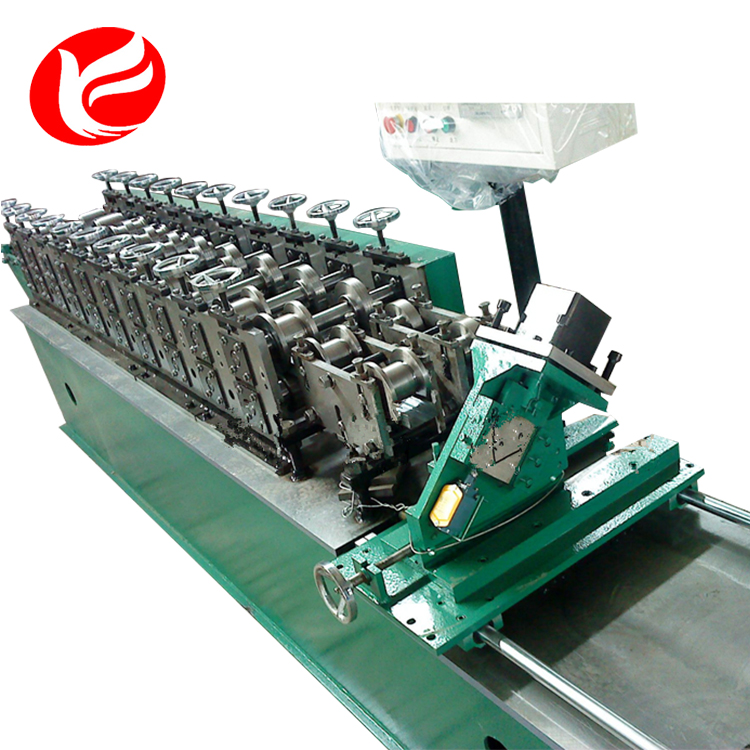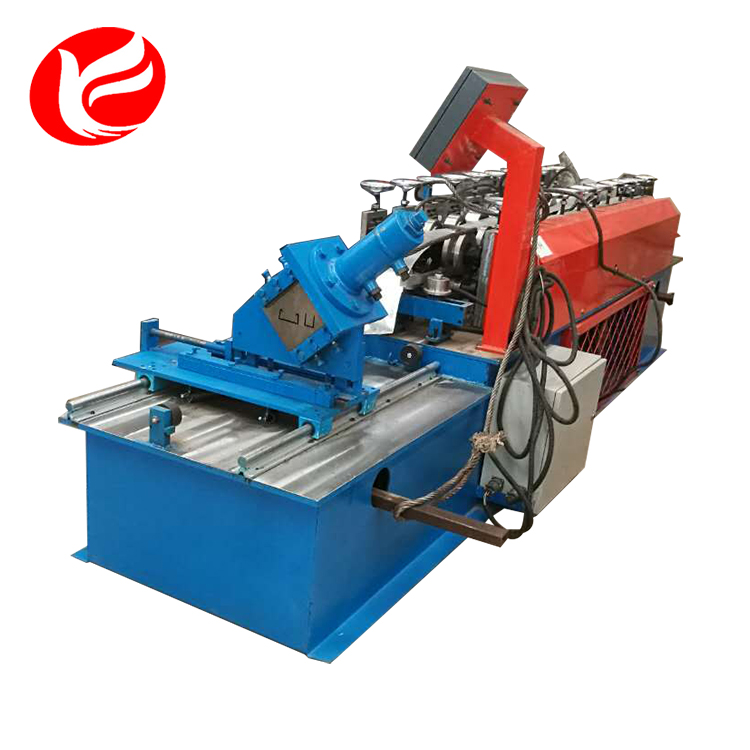C/U Channel&Ceiling Roll Forming Machine
Our light steel keel roll forming machine can be profile custom,and are lower cost,high efficiency,reliable working ,low energy consumption.we can do any type of equipment according to customer requirements.
Light steel keel is good in bending resistance, straightness, and it can cut, punch automatically, it is very easy and convenient to use. It can be used as bearing structure in big and medium sized building, such as factories, warehouses, garages, hangars, gyms, exhibitions, theater and so on.
C/U Channel&Ceiling Roll Forming Machine C Channel Ceiling Roll Forming Machine,U Channel Ceiling Roll Forming Machine,C/U Steel Ceiling Roll Forming Machine,C/U Galvanized Ceiling Roll Forming Machine Cangzhou Feiyang Machiney Manufacturing Co., Ltd. , https://www.coldformingmachines.com
(1) The main purpose of controlling air leakage technology is:
Reduce or eliminate the supply of loose coal oxygen. Technical means are: cement spray; foam spray; nano-modified elastomer material application; pressure equalization.
The cement shotcrete has a large workload, many rebounds, poor dynamic pressure resistance, and the plugging effect is not very satisfactory; the foam plugging performance is good, the dynamic pressure resistance is good, but its cost is high, it decomposes at high temperature, and releases harmful gases; The nano-modified elastomer material has the properties of good air tightness and large elongation. It can be scraped, coated and wiped in the leakage of coal rock, wood and closed wall. It is easy to operate and easy to use. The curing time can be adjusted according to the construction needs. After curing, the surface forms an elastomer.
The closed-area pressure equalization can reduce the air leakage into the enclosed area. The open-area pressure equalization can reduce the pressure difference around the goaf and reduce the leakage of coal into the goaf, thus reducing the risk of spontaneous combustion, but it has already occurred or has occurred. In the self-igniting fire zone, it is unrealistic to rely solely on the pressure equalization to completely eliminate the air leakage and prevent spontaneous combustion.
(2) The main purpose of the fire zone inerting technology is:
Reduce the O2 concentration in the fire zone and suffocate the fire zone. The technical means are: injection of inert gas such as N2 and CO2; inert gas foam; three-phase foam.
Inert gas and foam can cover the entire space, which can quickly smother the open flame and inhibit the development of the high-temperature fire zone of coal seam spontaneous combustion. However, the cooling effect of the coal body with large heat capacity is not good, the fire extinguishing cycle is long, and the fire zone is easy to re-ignite. And the requirements for on-site plugging air are high.
The inert foam and three-phase foam can play the role of nitrogen fixation, cooling, reducing air leakage, reducing oxygen concentration in the goaf, and encapsulating the coal body. However, the foam has a short stabilization time, is injected in the crushed coal, has poor foaming performance, and has a foaming multiple. Low, if it only acts as a resisting agent, the cost is too high and the efficiency is low. For the floating coal that has formed high temperature, only the inertia foam is used to extinguish the fire, and the amount of inert foam is large, and it is easy to re-ignite.
(3) The main purpose of coal body resistance technology is to:
Reduce the oxidation activity of coal and inhibit the coal-oxygen combination. The technical means are: injection of CaCl2, MgCl2 and other highly water-absorbing salts; atomization inhibitor; inertization inhibitor.
When the aqueous solution of CaCl2 and MgCl2 adheres to the surface of the coal body, a film of aqueous liquid is formed to prevent the contact of coal and oxygen, and at the same time, the coal body can be kept in a wet state for a long time, and the temperature is not easily increased at the time of low temperature oxidation, thereby suppressing the self of coal. Heat and spontaneous combustion; the retarding agent has a good fireproof effect, but when the water in the coal evaporates and is reduced to a certain extent, the resisting action will stop, and then become a catalytic effect, promoting the oxidation and spontaneous combustion of the coal.
When the coal temperature exceeds a certain temperature, the inerting inhibitor will start to absorb heat and vaporize, generate an inert gas, and block the free radical chain reaction process in the fire zone. The residue after pyrolysis is naturally coated with a film on the coal surface. After cooling, it becomes a brittle covering, which separates the coal from the air; however, the material is not easily dispersed evenly into the coal body, and the fire-fighting performance is fully exerted, and if it is injected into the coal body with its aqueous solution, it is easily lost.
(4) The main purpose of the heat absorption and cooling technology is:
Reduce the temperature of the high temperature coal body, completely extinguish the high temperature fire zone, and prevent the fire zone from re-igniting. Technical means are: water injection; grouting; liquid nitrogen; liquid CO2.
The key to extinguishing the coal fire zone is to reduce the coal temperature. Water is the most economical and most widely used heat-absorbing and cooling material. Its heat capacity is large. When 1L of water is converted into steam, it absorbs 2256.7kJ of heat and is naturally 1.7m. Water vapor can quickly reduce the temperature of coal. A large amount of water vapor has the effect of diluting the oxygen concentration in the air, enveloping, isolating the fire source and suffocating the fire source. Grouting and fire prevention technology is widely used in mines with natural fire hazard in China. The mud can absorb heat and cool down, and has a wrapping effect on the coal body to achieve the purpose of oxygen barrier. The fire prevention effect of the goaf is obvious, and it has become one of the main measures to fight the fire in the underground.
However, the self-igniting fire source in the underground is usually in a relatively high position. When it is extinguished with water or mud, it can not stay in the fire site, and it is easy to form a fixed channel activity. After flowing through the fire site, only the surface temperature of the coal is lowered, and the internal temperature of the coal body is still very high. High; the flushing of water takes away the ash on the surface of the coal body, and exposes the surface of the new coal body. The violent evaporation of water increases the porosity of the coal, making the air leakage channel more smooth; the water will decompose into H2 and O2 above 600 °C. There is a danger of water and gas explosion, posing a great threat to downhole firefighters.
(5) Colloidal fire-fighting technology The anti-extinguishing technology developed by Xi'an University of Science and Technology, such as gel, colloidal mud, thickened colloid and composite colloid, integrates the functions of plugging, cooling, resisting and solidifying water, making the easy-to-active aqueous solution At the specified time and location, gelation occurs, the high temperature coal body is wrapped, and the heat absorption and cooling effect of the water is fully exerted, so that the problem of leakage loss of grouting and water injection is better solved. In the open fire of nearly 1000 °C, it will not vaporize rapidly, but will gradually shrink due to the slow evaporation of water. The fire safety is good. Under the environment of 90% humidity and 28 °C, it will remain intact after 13 months.


Fire prevention technology currently used at coal mines are: plugging, equalizing, inert gas, inert foam, foam-phase, stopping agent, fogging agent resistance, resistance inerting agent, fire water, grout, colloidal Fire-fighting technology, etc., these technologies can be returned to the following categories according to their main functions and functions: (The following are all specific measures to read the following themselves)